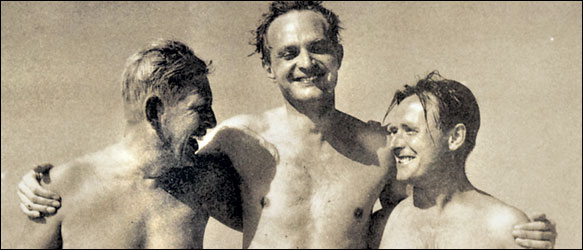This was just before he died. He was laid up in bed with a broken hip, much to my surprise, because I don’t think I’d been forewarned. Anyway, following the piece he’d contributed in 1985 to my festschrift to mark Grigson’s 80th I was now writing a biography and had written to Spender more than once about his sometimes uneasy relationship with the poet and critic. I’d visited the wonderful Harry Ransom Center in Austin, among other places, and one of the items I’d unearthed had been an excoriating squib written by his one-time friend, which as far as I knew, had never been published. Just as well, really, since had it been, it is unlikely that Spender would have cooperated at all. I’d also discovered that a mutual friend had seen Grigson put out a cigarette on a photograph of Spender’s face.
 |
| W. H. Auden,Stephen Spender & Christopher Isherwood on Fire Island,1947 |
As I moved towards St John’s Wood that afternoon I asked myself if I could honestly mention these two pieces of evidence of Grigson’s dislike of him –one a fact of which I carried no proof, the other, possibly apocryphal , and even malevolent. As I sighted what I knew must be Spender’s home—a very handsome Regency villa covered with wisteria and sporting wrought ironwork — the nerves began to play up. I was about to meet a man of 89--the last surviving (unless you count Edward Upward ) figures of the Auden generation. Was it wise to open wounds that had never fully healed ? I decided that I could not risk it—not in Spender’s own home. The cigarette butt and the squib would play no part. I would have to tread softly.
The interview went pretty well. Spender was friendly and polite, though hardly enthusiastic about his old friend. I felt as if he was holding back, although his memory might have been poor. Perhaps assuming that I was aware of Grigson’s mixed feelings towards him, he did bring up an example of his fellow poet’s brutal honesty—a hostile review by Grigson of a book by or about Cecil Day Lewis (I cannot recall which) published when the latter was terminally ill.
Before I left the house I kept my ears pricked for the sound of Edna Everage—Barry Humphries had married Spender’s daughter—but alas, could hear nothing that sounded Australian.
Spender died a month or so later.[RH]
